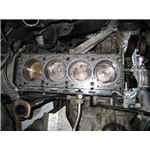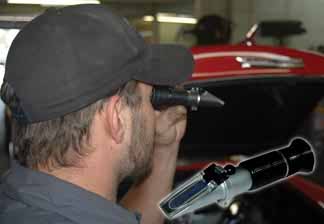 Determining whether or not your vehicle has a blown head gasket, cracked head, or some other serious engine problem can sometimes be a difficult task. A compression test can tell you that cylinders are low but don’t always indicate what the problem is and can lead to wasted money. This article will discuss a method on how to test for a cracked head or blown head gasket. This method is extremely simple and can be accomplished in several minutes with the right tools. To understand how this method works we will have to discuss how your engine’s cooling system works. Your engine’s cooling system works by flowing coolant through a radiator and allowing air to pass through thus cooling the coolant. The coolant then travels through a hose to the engine block. The engine block has many coolant passages that flow through it. These passages flow through the block itself and through the heads. If you have a blown head gasket or cracked head, you will end up having several situations occur. The first is that you can end up burning coolant in your engine. This is not good and can lead to premature bearing failure. When engine oil and coolant mix the coolant displaces the oil and your engine lacks lubrication because in place of oil there is coolant. Another thing that can occur when you burn coolant is that you can cause a severe overheat condition for your engine. This can lead to piston’s reaching excessive temperatures and expanding and touching the cylinder walls. This will cause scoring of the cylinders and pistons. The last common problem that can occur is that combustion gases escape into your cooling system. This can cause a decrease in power, and if in excess can cause cooling system problems. With all of these problems at risk and now that you understand how your engine’s cooling system works, we can now discuss the simple procedure to determine whether or not your engine in deed has a cracked head or blown head gasket.
Determining whether or not your vehicle has a blown head gasket, cracked head, or some other serious engine problem can sometimes be a difficult task. A compression test can tell you that cylinders are low but don’t always indicate what the problem is and can lead to wasted money. This article will discuss a method on how to test for a cracked head or blown head gasket. This method is extremely simple and can be accomplished in several minutes with the right tools. To understand how this method works we will have to discuss how your engine’s cooling system works. Your engine’s cooling system works by flowing coolant through a radiator and allowing air to pass through thus cooling the coolant. The coolant then travels through a hose to the engine block. The engine block has many coolant passages that flow through it. These passages flow through the block itself and through the heads. If you have a blown head gasket or cracked head, you will end up having several situations occur. The first is that you can end up burning coolant in your engine. This is not good and can lead to premature bearing failure. When engine oil and coolant mix the coolant displaces the oil and your engine lacks lubrication because in place of oil there is coolant. Another thing that can occur when you burn coolant is that you can cause a severe overheat condition for your engine. This can lead to piston’s reaching excessive temperatures and expanding and touching the cylinder walls. This will cause scoring of the cylinders and pistons. The last common problem that can occur is that combustion gases escape into your cooling system. This can cause a decrease in power, and if in excess can cause cooling system problems. With all of these problems at risk and now that you understand how your engine’s cooling system works, we can now discuss the simple procedure to determine whether or not your engine in deed has a cracked head or blown head gasket.
Posts Tagged ‘cooling’
How do I know if my Head Gasket is blown? Using a pressure tester to determine if you have a blown head gasket
Monday, October 3rd, 2011How do I replace my GM V6 Intake Gaskets?
Sunday, March 27th, 2011Intake gaskets can be a very costly failure if you do not service them immediately upon finding them worn. The intake gaskets on GM 3.1 liter, 3.4 liter, and 3.8 liter are very well known for having troubles. These are some vehicles that have intake gasket problems. So if you have a vehicle with one of these engines in them, make sure that you ask your dealership about some of the updated gaskets and intake manifolds to help prevent the failure.
We will discuss how an intake gasket fails. Generally the intake gasket fails so that you will have engine coolant leaking into the engine. This is bad because a liquid is not only uncompressible and can hydro lock a motor but it does not mix with oil. If you run the engine long enough with this leak then you will have a lack of lubrication because there will be water in your oil and water does not have the lubrication properties of engine oil.
How do I accurately test my Coolant?
Sunday, September 12th, 2010 Any time is a good time to test your coolant but most important is when winter months are approaching. I know that there are many other articles on how to check your engines coolant for the proper mixture. I am not saying that any of these methods are incorrect.
Any time is a good time to test your coolant but most important is when winter months are approaching. I know that there are many other articles on how to check your engines coolant for the proper mixture. I am not saying that any of these methods are incorrect.
I am going to discuss a method in this article, which I find to be the most accurate method possible. The problem with some of the other methods such as the floating ball method is that there are many different kinds of coolants out there. This means that you have to have the exact tester for those coolants to make the gauge read accurately. Sometimes you may also be unsure what type of coolant is in the vehicle, and you then don’t know what tester to use. This can also lead to using an incorrect tester and getting incorrect reading that either say your coolant is the correct mixture when it is not, or else saying it needs more antifreeze when it does not.
The method this article is going to focus on is using a refractometer. A refractometer, such as this ATD3705 Coolant Refractometer or Robinair 75240 I have found to be the most versatile, accurate and economical way of checking cooling systems.
